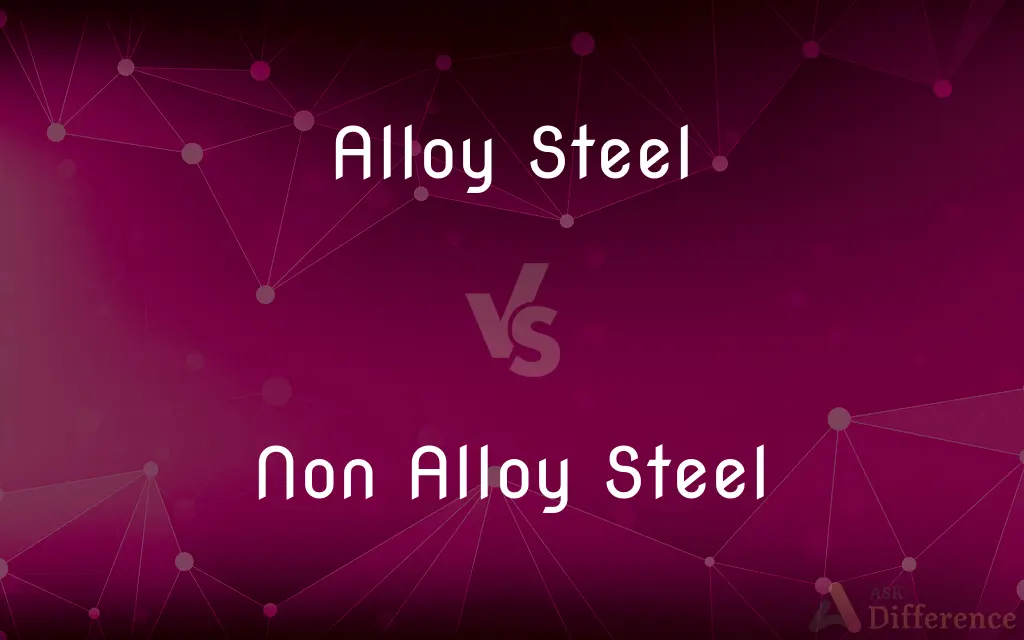Alloy Steel vs. Non Alloy Steel — What's the Difference?
By Tayyaba Rehman — Published on January 13, 2024
Alloy Steel contains additional elements for improved properties, while Non Alloy Steel lacks these added elements and consists primarily of iron and carbon.

Difference Between Alloy Steel and Non Alloy Steel
Table of Contents
ADVERTISEMENT
Key Differences
Alloy Steel is defined by the addition of specific elements to its composition beyond just iron and carbon. These added elements, such as nickel, chromium, or molybdenum, serve to enhance the steel's mechanical and physical properties, making it more suitable for certain applications.
Non Alloy Steel, on the other hand, mainly consists of iron and carbon without the addition of other alloying elements. This type of steel relies primarily on the properties derived from the iron-carbon combination, rendering it more basic in its features and functions.
When considering performance, Alloy Steel, due to its alloying elements, often possesses superior strength, corrosion resistance, or ductility compared to its non-alloy counterpart. Such attributes make Alloy Steel more adaptable for specific industrial applications or environments.
Conversely, Non Alloy Steel, without the influence of additional elements, might not offer the same level of specialized properties. However, it remains a fundamental material in many industries because of its simplicity and cost-effectiveness.
In a broader perspective, while Alloy Steel is tailored for enhanced performance in specific scenarios, Non Alloy Steel stands as a versatile, general-purpose material. Understanding the distinction allows for better material selection based on the demands of a particular project or application.
ADVERTISEMENT
Comparison Chart
Composition
Iron, carbon, and additional alloying elements
Primarily iron and carbon
Properties
Enhanced strength, corrosion resistance, ductility, etc.
Basic properties from iron and carbon combination
Applications
Specialized industrial tasks, high-stress environments
General-purpose applications
Cost
Generally more expensive due to added elements
Typically more cost-effective
Performance
Tailored for specific scenarios
Versatile, foundational material
Compare with Definitions
Alloy Steel
Alloy Steel's properties are modified by added elements.
The introduction of chromium makes this Alloy Steel stainless.
Non Alloy Steel
Non Alloy Steel offers general-purpose properties.
Non Alloy Steel beams support the structure.
Alloy Steel
Alloy Steel can resist environmental challenges.
The Alloy Steel pipes were chosen for their heat resistance.
Non Alloy Steel
Non Alloy Steel lacks significant additional alloying elements.
The rods, being Non Alloy Steel, are straightforward in composition.
Alloy Steel
Alloy Steel offers specialized features for tailored applications.
High-speed tools are often made from a specific Alloy Steel.
Non Alloy Steel
Non Alloy Steel is often more cost-effective than its alloyed counterpart.
For budgetary reasons, they opted for Non Alloy Steel fixtures.
Alloy Steel
Alloy Steel has a varied composition based on its intended use.
This Alloy Steel contains nickel for increased strength.
Non Alloy Steel
Non Alloy Steel consists mainly of iron and carbon.
The gates are made of basic Non Alloy Steel.
Alloy Steel
Alloy Steel is steel enhanced with various alloying elements.
The bridge was constructed using Alloy Steel to resist corrosion.
Non Alloy Steel
Non Alloy Steel is a foundational material in many industries.
The factory uses Non Alloy Steel sheets for its products.
Common Curiosities
Is Alloy Steel stronger than Non Alloy Steel?
Generally, Alloy Steel can be tailored for greater strength, but it depends on the specific alloy and application.
What makes Alloy Steel different from Non Alloy Steel?
Alloy Steel contains additional alloying elements, while Non Alloy Steel is primarily iron and carbon.
Are there different types of Alloy Steel?
Yes, there are various types of Alloy Steel, depending on the alloying elements added.
Is stainless steel a type of Alloy Steel?
Yes, stainless steel is an Alloy Steel with chromium added for corrosion resistance.
Why might one choose Non Alloy Steel over Alloy Steel?
Non Alloy Steel is often more cost-effective and suitable for general-purpose needs.
Can Non Alloy Steel resist corrosion?
Non Alloy Steel lacks the corrosion resistance of some Alloy Steels but can be coated or treated for better protection.
How do I identify an Alloy Steel?
Alloy Steel's composition, including its specific alloying elements, distinguishes it.
Does Non Alloy Steel have a uniform composition?
While primarily iron and carbon, minor variations might exist based on manufacturing.
Are there applications where Non Alloy Steel is preferable?
Yes, Non Alloy Steel is ideal for many general applications where specialized properties aren't required.
How does the cost of Alloy Steel compare to Non Alloy Steel?
Alloy Steel is generally more expensive due to its added elements and specialized properties.
Share Your Discovery

Previous Comparison
Adversarial Relationship vs. Partnership Relationship
Next Comparison
Liberator vs. OppressorAuthor Spotlight
Written by
Tayyaba RehmanTayyaba Rehman is a distinguished writer, currently serving as a primary contributor to askdifference.com. As a researcher in semantics and etymology, Tayyaba's passion for the complexity of languages and their distinctions has found a perfect home on the platform. Tayyaba delves into the intricacies of language, distinguishing between commonly confused words and phrases, thereby providing clarity for readers worldwide.














































